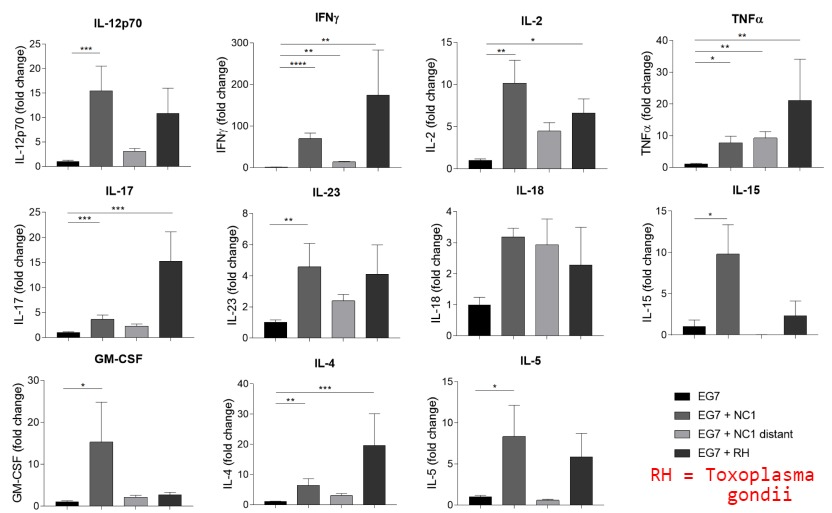
Neosporosis, caused by the intracellular parasite Neospora caninum, presents a significant challenge in veterinary medicine, leading to serious and life-threatening neurological issues in dogs, and costing the industrial cattle industry billions each year. N. caninum does not infect humans, making it a potentially safe therapeutic agent.
The study, “Neospora caninum: a new class of biopharmaceuticals in the therapeutic arsenal against cancer“, published in the Journal for ImmunoTherapy of Cancer in 2020, brought to light the game-changing potential of N. caninum in cancer therapy.
The study reported N. caninum effectively destroyed cancer cells and stimulated the immune system to fight tumors. In experiments using a mouse model of thymoma (a type of cancer that affects the thymus gland), researchers observed that injections of live N. caninum tachyzoites, either directly into the tumor or at a distant site, led to significant tumor regression and, in many cases, complete eradication.
Unleashing the Power of the Immune System
The study’s findings point to several key mechanisms by which N. caninum exerts its anti-cancer effects:
- Direct Cytotoxic Activity: The researchers observed that N. caninum tachyzoites can directly infect and kill cancer cells.
- Immune System Activation: N. caninum effectively stimulates the immune system, prompting the recruitment of immune cells to the tumor site, effectively transforming what would normally be “cold” tumors (tumors that are not infiltrated by immune cells) into “hot” tumors (tumors that are heavily infiltrated by immune cells).
- Reprogramming the Tumor Microenvironment: N. caninum alters the tumor’s microenvironment, reducing the presence of immunosuppressive factors that can hinder the immune system’s ability to fight cancer.
The study also highlights the critical role of natural killer (NK) cells, CD8+ T cells, and macrophages in the N. caninum-mediated anti-tumor response. Depleting these immune cell populations through specific antibodies completely abolished N. caninum‘s antitumor activity, underscoring their importance in the process.

Advantages Over Existing Therapies
The researchers contrasted N. caninum‘s potential as a cancer therapeutic with the limitations of currently available agents, such as viruses and bacteria, which are sometimes associated with toxicity and safety concerns.
The study authors emphasized these advantages of N. caninum:
- Safety: Unlike viruses and bacteria that can persist in the body and potentially cause harm, N. caninum is naturally cleared from the system after initiating an immune response, making it a safer alternative.
- Targeting Efficiency: N. caninum exhibits a remarkable ability to penetrate tumors and cancer cells. This is attributed to its unique apical complex, a specialized structure that allows it to effectively invade a wide range of cell types.
- Genetic Engineering Potential: N. caninum has a large genome capacity, meaning it can be genetically engineered to carry therapeutic payloads. This opens up possibilities for creating “armed” strains that can deliver additional anti-cancer agents directly to tumor cells.
Promising Results with Human Tumor Model
To further explore the potential of N. caninum for treating human cancers, researchers conducted experiments using a mouse model of Merkel cell carcinoma (MCC), a rare and aggressive form of skin cancer. The results were highly encouraging, demonstrating that treatment with N. caninum led to a significant regression of MCC tumors.
Engineering an Enhanced Strain: NC1-IL15hRec
Recognizing the need for even more potent anti-tumor responses, particularly in advanced or refractory cancers, the researchers engineered a strain of N. caninum called NC1-IL15hRec. This strain secretes a human form of interleukin-15 (IL-15), a cytokine that plays a crucial role in stimulating the immune system, particularly NK cells and CD8+ T cells.
Experiments showed that NC1-IL15hRec induced a robust increase in the proliferation and activity of human immune cells. When tested in the mouse model of thymoma, NC1-IL15hRec exhibited superior anti-tumor efficacy compared to the unmodified strain, demonstrating the potential of enhancing N. caninum‘s therapeutic properties through genetic engineering.
A New Frontier in Cancer Immunotherapy
This study represents a significant step forward in the development of novel cancer treatments that harness the power of the immune system. The findings suggest that N. caninum holds immense promise as a new weapon in the fight against cancer. Further research is ongoing to fully unlock its therapeutic potential and bring this innovative approach to the clinic.
